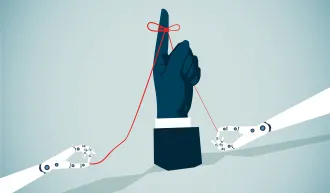How do you go about restoring trust in a 162-year-old company rocked by one of the worst corruption scandals in corporate history? That was the challenge facing Peter Löscher when he joined German conglomerate Siemens AG as president and CEO three years ago.
In 1998 the electronics and manufacturing powerhouse was fined a record US$1.34 billion for paying bribes and kickbacks to secure contracts. Löscher, a former General Electric and Merck executive, was hired in 2007 after Siemens executives had been tainted by the scandal as the first outsider to lead the company.
For many people in America, Siemens isn’t a household word, but it is an engineering powerhouse and Europe’s biggest conglomerate, selling everything from hearing aids to high-speed trains. The US$100 billion company employs more than 400,000 people in 190 countries.
Before an audience of more than 200 Stanford GSB students on Nov. 2, Löscher spoke about leading a new regime at Siemens. The speech was part of the View From The Top series.
Realizing what had created the Siemens scandal was a leadership crisis, Löscher went about clearing out more than half of the firms’ senior management team. “Resolving it in the fastest time was the highest priority,” he said. “Siemens didn’t need revolution but rather evolution, and it needed to be done with speed, speed, speed.”
Löscher, the unknown, became the face of Siemens. He launched a 100-day tour that took him around the world to meet with employees and clients. “It was important to make sure I was as visible to as many people as possible, and that I listened to as many as possible. It was very important to get input, feedback about what had to be changed.”
He created a leadership team of trusted executives and set about getting the organization to “speak with one voice, one direction.”
Löscher said he applied his own principles to cleaning up Siemens: Determination, passion, execution, and what he called having a “true north — a clear definition for myself of right and wrong.”
The turnaround experience prompted him to dispense some advice to the aspiring leaders in the audience. “Make sure the company values are actually lived.” He said the corrupt Siemens executives had testified that they took bribes “for the benefit of the company.”
“The most dangerous thing you can do is do it because everyone does. It’s up to you to say no,” he said.
After three years in the top spot, Löscher is now focused on sustainable infrastructure — ensuring Siemens gets a spot at the table when it comes to green initiatives. He met with President Barack Obama at Siemens’ new wind turbine plant in Fort Madison, Iowa, and is in the process of developing a clean energy city called Masdar outside Abu Dhabi in the United Arab Emirates.
“Our objective is to achieve a €25 billion clean tech portfolio,” he said, adding that Siemens is in a position to “link the smart grid infrastructure and the smart building infrastructure.” Another project is Desertec, solar thermal power plants in sun-rich regions of North Africa and the Middle East that would produce electricity and send supplies to Europe via high-voltage power lines or undersea cables. He is also pushing Siemens to work with outside partners on research and development.
He is fond of saying that 90% of innovation in any company happens outside the company. “We see the centers of innovation changing and shifting,” he said. “We have to take advantage and tap into the networks.” The company has R&D labs in 30 countries, including the United States.
Löscher, 53, is a native of Austria. He studied economics at the Vienna University of Economics and Business and at the Chinese University of Hong Kong. He has an MBA from Vienna University and graduated from the Advanced Management Program at Harvard Business School. Prior to joining Siemens he was president of global human health at Merck & Co. and president and CEO of General Electric Healthcare Bio-Sciences.
For media inquiries, visit the Newsroom.






